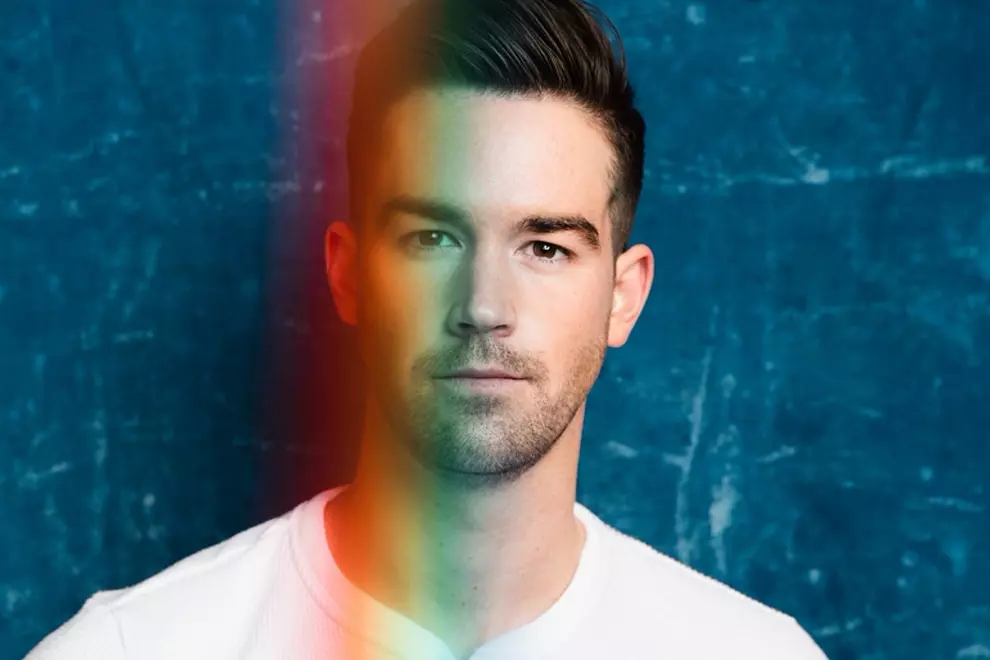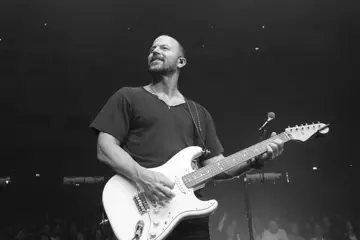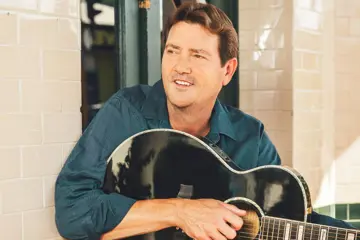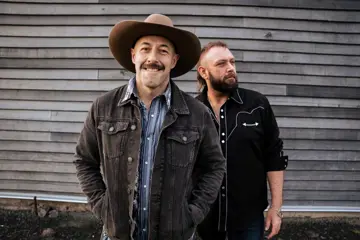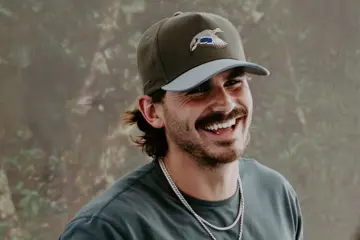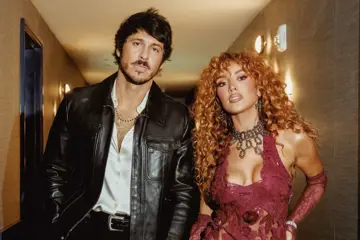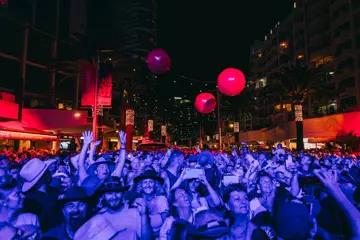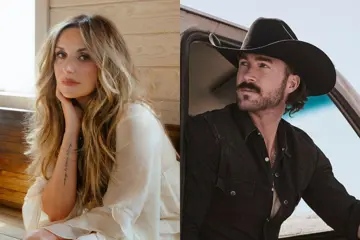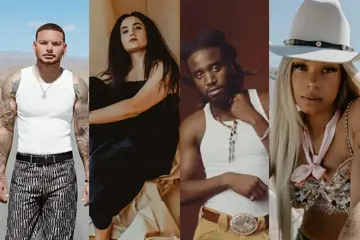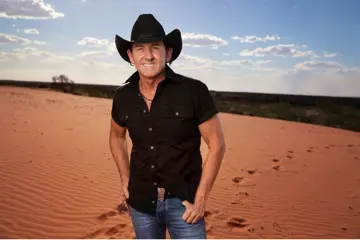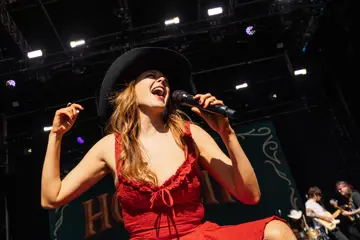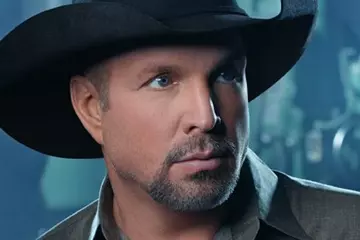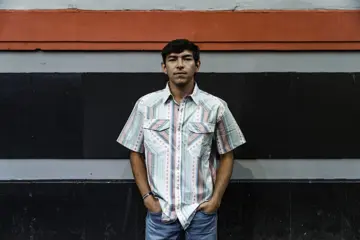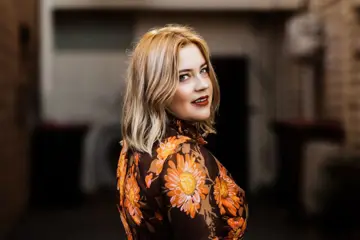Nashville-based rising pop-country star Hayden Joseph prides himself in his inclusive lyrics and messages of self-acceptance, as an openly gay male pursuing a country music career. Breaking boundaries in genre and sexuality, he uses lyricism and his captivating personality to tell his story.
Hayden released his debut album Different in 2020, and it has garnered over 300K streams since. He wrote and released the single, also his debut, of the same name for anyone who has ever felt “different.” He also uses his social media presence – almost 160K TikTok followers and over 60K followers on Instagram – to share his new music and covers, and to call out how bro-country has become the standard in country radio.
He dropped his uplifting new single, Out on June 1st to kick off Pride month. We caught up with Hayden to talk about diversity and inclusivity in country music, the act of coming out and the careful art of crafting lyrics.
I listened to a recent interview with Fox News Nashville where you said that you hope to make music for everyone. Can you go into more detail about what you mean by that?
Country music is now I feel like written for a very, very specific demographic that is much more narrow than it was 15 or 20 years ago. What I mean by that is, I feel like the vast majority of major artists are obviously men that look and sound pretty similar and they sing about very similar things. This is not to talk disparaging about other artists. I'm not saying that there's no room for that in country music, there absolutely is, but we've seen country music have a much broader scope in the past. The late 90s and early 2000s, some of the biggest acts in the genre were women and Garth Brooks singing emotional song after emotional song. You don't see that anymore and it almost feels like a conscious shift.
Join our community with our FREE weekly newsletter
I write music from a perspective that is unique to me, and my story is unique to country music, considering the artists that have come before me. My goal is just to widen the scope to include a piece of that story while also relating to as many people as possible. I don't want to just write music for the LGBT population, I want to write music for as many people as I can. I think music is one of the things that actually can be universal. And, unfortunately, when people hear that statement, they hear a divisive statement, which I think is a sad testament to where at least America is right now [laughs].
Trends change in music though. So, wouldn’t it be more an evolution than a conscious shift?
Sure. But how are they going to come back around unless you have artists saying they need to come back? That's how trends work, you're right. But it only happens when new artists come in and say, “people that influenced me, weren't singing about the stuff I'm hearing right now. I don't like the way this feels, and I want to change it.” So that's what I'm trying to do.
People will comment on stuff, like, “why are you criticising the genre that you want to be a part of?!” I don't view it as criticism; I view it as challenging. I'm challenging the status quo that I feel like doesn't work for a lot of people – and I'm not the only person saying this. Challenging the status quo is not criticising, it's questioning and trying to make something better.
But then you could also argue that the people who listen to those kinds of "bro-country" songs that you’re talking about don't want that kind of music anyway and probably wouldn’t listen to the music you and other artists who have or do feel excluded have been putting out.
Yeah, there's nothing that says country music can’t be about those things. All I'm saying is that country music shouldn't only be about those things. I'm not trying to take anything away from anybody that likes that. But it's not fair for people that that doesn't apply to to now have a genre of music that's drifted away from them. It doesn't have to work like that. The common responses of “that's how country music is” is factually untrue. I think we just need to broaden the scope. Some people, that feel like they've been kind of shut out of genre that used to include them a little bit more, can now feel like, “Oh, this is moving back in the direction that I can relate to.”
Just speaking from my own personal experience, I grew up in the southern United States on country music. I was born in the mid-90s, so I saw the rise of Shania Twain, Garth Brooks, Faith Hill and these are artists that reached a level of stardom that really hasn't been seen by anyone else other than maybe Taylor Swift. And they did it because they were saying new things. They were sounding different. They were appealing to a lot of people. That was such a successful era of country music and I think we've drifted away from that. And part of it is, we've drifted away from accepting new looks, new sounds and new styles and broad lyrics to where it's a very narrow subset of people that can really relate to the songs.
But if, like what you’ve been saying, there are other artists who feel that same way and are making music in that kind of style – is your argument then geared towards the kind of music being played on more mainstream platforms such as radio?
It’s very true. There's a weird dichotomy in the US where streaming playlists don't necessarily match radio airplay. Unfortunately, radio airplay is still major driver of notoriety in the United States. Streaming playlists are full of emotional songs, but radio stations/charts are not. I can't say the labels are willing or unwilling (I don't know as much about that piece of it) but when what's driving money and notoriety as an artist is still coming from mainstream radio, and that's not playing artists who look or sound any different, that creates a bit of a problem and a bit of a disconnect. A good example I can give of this is Kacey Musgraves won all-genre ‘Album of the Year’ at the Grammys in 2019. So, the best album, among peers of all genres, [but] didn't have a charting single on country radio, like how do you marry those two things?
It's not that good music isn't being made, it's just that there's a weird disconnect between what people think people want to hear and what I believe people want to hear [laughs]. There's some evidence to suggest that and 100k people who now follow me on social media, I'm hopeful suggest that.
Your recent releases Out and The Guy After The Guy both could appear suggestive, but when listening to the songs a little deeper, the lyrics are cleverly crafted, not overt and aren’t maybe what people may think based on the titles alone. Even your uplifting new single Out, which you released in June to kick off Pride month, at its core, is a song about celebrating the person you are. Are these both good examples of what you mean by being an inclusive songwriter?
I like to leave them all in for interpretation. I mean Out was very much meant to be like, celebrate who you are, celebrate what you are, but I was like, I don't want to do with that overtly, because that will be unfortunately off putting to some part of the fanbase. So, I said, “Let's make a song and it's a play on the word ‘Out’.” To you, it's absolutely about coming out, but if you didn't read the press release for that song and weren't really listening/deciphering those lyrics, I don't think people would hear it.
The Guy After The Guy like, I'm into this third person narration like you're talking to your friend is how I meant it to start. A lot of people heard that, like, “Oh, he's using male pronouns” but if you listen to the lyrics, I'm actually not because, at the end, it's me the whole time.
I think a big problem is – I live in Nashville, I play my songs all the time, and even though there's no overt LGBT references in my songs, the amount of times I've been told something is too emotional, too polished, too honest, those are all micro aggressions against that. I know people can try to pretend like they're not, but no one said that to Garth Brooks when he was writing or singing on Unanswered Prayers, but they said it to me whenever I sang a song that's very similar because of that.
My goal is not to be, “I'm the gay country singer.” My goal is to be the country singer that can find a way to break into the mainstream, because that's never happened before.
If you wanted to say, write a love song, and dedicate it to a certain guy – whether using his name or specific male pronouns – would you not do that then knowing that it could be off putting to certain listeners and, as you say, you’re wanting to appeal to a wider audience? Aren’t you then hiding a piece of your personal self having to craft your songs that way?
To be very honest with you, I think it's a good question. Long story short, I think you're right. What I recognise is that in a world where, statistically, 90+ percent of people are heterosexual, that me writing songs using masculine pronouns may be off putting to some people, I recognise that fact. But the concept of love is not. So, in my mind, if I write a love song, and I do use open-ended pronouns, it tells my story. In no way to me right now does that feel less personal. I'm still telling my story. I'm being a little bit more open-ended so people can interpret it in different ways. That allows people, that, have been shut out from interpreting their own story because of very direct language, now have an open-ended story.
That's how I see it right now. That's how all my music, in terms of pronouns, is written right now. It's always you or third person and that's very intentional. I want to stay true to myself. I'm not gonna lie. But also, I want everyone who possibly can to have to find the meaning in those lyrics. I think using open-ended stories benefits everyone. I don't think it's a disadvantage.
Now, if someone asked me this question in five years, I might feel differently. When you come to terms of this piece of yourself and get more comfortable and more open with it, your opinions change on it pretty quickly. I will be very candid about that. My opinions on how much to share, how to share it and what to share have changed drastically in the last five years. So, five years from now, I might say, I can't believe I ever didn't just come out and say it. But right now, I want to be practical.
This is a market that's never signed an openly gay man to a major label. That's just a fact. And so, I think walking in and just trying to eliminate 90% of your market right there by being very adamant about using certain pronouns rather than coming at it from “I want to leave this open-ended and open to interpretation so you don't have a reason to say, ‘this can't work for your market’.”
As a heterosexual female, I’ve always found the experience of having to “come out” as a weird one. Like, if you’re that way inclined, why can’t you just come home with someone of the same gender? Straight people don’t need to announce that they’re straight – so why should someone who is queer have to? Do you think we can get to a point where the act of coming out is a thing of the past?
I would love to get to the point where people don't have to come out. Unfortunately, society still does groom you very much to be heterosexual, and that's just a fact. I don't know if we'll ever veer away from that. I see a lot of progress made but I know there's still a lot of work to do. But younger generations are completely different. Even talking to my younger brother, his mentality on it is completely different than what mine was when I was a teenager, and that does give me hope for it.
But the reason we have to come out is because of little things that people just don't even think about. Little boys are taught that they're supposed to be a Prince Charming for a girl. The scenario was reversed for me, like, somebody came in and was my Prince Charming. But that's not a concept that you're thinking about at a certain age, because you've been groomed to see it the other way around your entire life. That's why people have to come out.
I can't say much about what the culture in Australia is like, but southern United States is still very religious and pretty set in its ways, particularly country music. And so, it's very much a long road ahead. But I'm a big believer in that the only way to normalise something is to have visibility and be confident in what you're doing. I'm trying to do what I can to show that I'm comfortable with myself. However, the music I'm putting out should speak for itself and there's no agenda with the lyrics I'm putting out.
What was your "coming out" experience like?
It's not a glamorous story by any means. It was very much a multi-year, multi-step, come to terms with yourself, gradually tell people. Growing up in the southern United States with a conservative religious family, you have to unpack a lot of things you've been your entire life, and basically unwind them and throw them out before you can really start accepting yourself and telling yourself and telling other people.
I'm very fortunate. Most of my reactions have been very positive. It was never, “We can't accept this.” It was, “We love you, but we need time to process this. This will be a journey for us as well.” I've accepted that and I see progress made on that every day, but not everyone's gonna have the celebratory reaction and not everyone's gonna be as lucky as I was.
What advice would you give to someone who is closeted but wants to come out?
Everyone's process is different. I'll say this, it is a huge weight lifted off your shoulders, at least in my experience. Hiding a part of yourself is exhausting. And once you eliminate the need to do that, you don't even realise how much of a weight it is.
They say the hardest person to come out to you as yourself. I would say that's true. I think I knew in the back of my mind when I was very young. When I admitted it to myself, I would say I was in my 20s. It's a crazy concept you look back on and you're like, “What mental gymnastics was I doing to, like, act like this wasn't the case for that long?!” But you do it. It's not logical to explain after the fact [laughs].
It’s interesting that you explain it like a weight being lifted off your shoulders. From what I’ve seen from artists and close friends, after coming out, they seem much more confident in themselves to the point where they feel free to be completely who they want to be. Is there a difference between who you were before you came out and who you are now in terms of your confidence level?
I will say there absolutely is. I don't know how much of that is just from coming out. I think everyone gets a little bit more confident in themselves as they grow up. I started coming out probably my junior senior year of college, so I was in my 20s. I'm five years out of school, worked several corporate jobs, moved back to Nashville, so I’ve got a decent amount of life under my belt now to figure out who I was.
I know exactly who I am and there's no longer room for people to shape and form my personality. I feel like, for a long time, especially when you're closeted, that's what happens. And it's taken me six plus years to get to where I am and confident in being myself. So, part of that comes from coming out and lifting that weight, and part of it comes from living life … and following your dreams helps too.
It sounds empowering. T.J. Osborne, lead vocalist of duo Brothers Osborne, hid his sexual orientation for 36 years (at least publicly), only coming out earlier this year. With this news, T.J. becomes the only openly gay artist signed to a major country label—a historic moment for the genre. He, however, explained being closeted as “painful, lonely and isolating.”
Yeah, it is. He's a little bit older than I am so doing it as an adult, moving away from home, working jobs and touring, I can't imagine hiding that part of yourself and doing all of that as well! I came out when I was younger, to where I got to, lack of a better term, "blossom into adulthood" with that weight lifted.
Before that, you're going through struggles that you can't talk to anybody about – it's terrible. I don't wish it upon anybody. And that's something I think people that don't experience it will never understand, and I'm not the kind of person that expects them to ever understand. It's more the acknowledgement that they don't understand and be willing to listen and accept. There are other points of view.
Maybe I'm in a fortunate position, but I haven't seen a lot of negative feedback for him coming out. I'm sure he has based on the fanbase that some of that country music has. I think that's unfortunate, and I feel for him. I've seen, at least in the industry and in Nashville, a lot of support for his decision and I think it's great for visibility for the community. I'm hoping we get to a point where you don't have to hide a piece of yourself for 10 years after you get signed. But this is a great step in the right direction.
You currently have almost 160K TikTok followers and over 60K followers on Instagram. There seems to be a trend of many country artists becoming popular due to their social media presence – especially TikTok more recently. What was your reasons for joining the popular video app?
I was one of those like, "It's very not me. Who's gonna listen to my story?" and then, one day, I just got motivated to post a very simple video about my frustrations and well the rest is history. It's certainly been an elevator of my career ability to get my story out there, but I wouldn't say they started on TikTok.
Now, it's one of those things. I could play a bar in Nashville for an audience of 20 people, or I could make two TikToks and a million people see that! That's how the internet works. It's crazy. When you're lucky … some days five people see it … you have no control. That's the best part.
It's very powerful, but it's also very opaque. A lot of times, there's no rhyme or reason to it, that's why I say it can be bad for your mental health. You start posting a song you're really proud of, and it doesn't get any views. I'm still working on not giving that too much weight. Anybody can be a star, but when anybody can be a star, it’s hard to be a star for more than a week.
Keep up to date with everything Hayden Joseph and follow him on Facebook here.
For more in-depth interviews from CountryTown, check out here.
Image: Supplied
